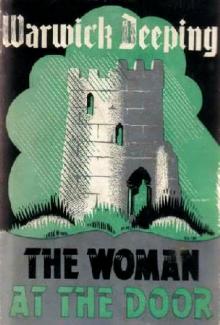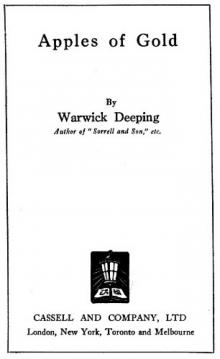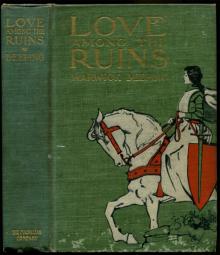- Home
- Warwick Deeping
No Hero-This Page 3
No Hero-This Read online
Page 3
The S.-M. re-enters the Colonel’s office, and Bunce comes down the corridor looking sullen.
“Where are you being shoved to?”
I tell him that I have been put in charge of the Venereals. It seems to amuse him for a moment. “Gosh, that’s funny!” I wonder why it should seem funny to Bunce, unless he regards me as a kind of simple and sweet virgin. But disgust with his own fortune brings that look of sullen loutishness back to his face.
“Shoved me out to some filthy little town nine miles from nowhere. Place called Billing.”
I can only suppose that in Billing the cooing will be too competitive, and shared by a thousand or so other men. This is my last meeting with Bunce, and I do not regret it.
* * *
Major Keyes, who is a regular soldier, with good looks and an assured manner, rushes me into the Venereal Block, gives me a curt three minutes’ introduction, and leaves me to my own devices. It is a rather disgusting business. I find that there are two circumcisions to be done, and a number of mercury injections to be given. I bungle one of the injections. The sergeant in charge is a realist, with a loud voice and a bad-tempered mouth. My fumbling does not seem to impress him either way. But when, feeling nervous and self-conscious, I try to joke with one of the patients, and there is a gurgle of laughter in the ward, he shouts fiercely, “Silence.”
Afterwards, in the corridor, he attends to my education.
“You’ll excuse me, sir, but it’s an offence against discipline. They are all crime cases.”
“Crime?”
“Yes, sir, a man in the army who makes himself unfit for duty is crimed, sir.”
“I see.”
I understand that I am not to regard my venereal cases as patients, but as men who have sinned against military efficiency. I suppose there is reason in the Spartan code, but why not “Crime” the women who gave the disease to them?
I ask the sergeant this, and he looks at me with his fiercely stupid eyes.
“Quite right, sir, but it isn’t easy to catch the sluts. Besides, there isn’t a law to prevent a man being ’uman.”
“So it is only the results that matter?”
“Quite so, sir.”
* * *
My new friend Captain Macartney waits for me in the staff room, and takes me down to see No. 7 Trafalgar Terrace. Macartney is the Quartermaster, and a regular, a man who has risen from the ranks, and the rugged and humorous serenity of his kind old face more than consoles me for the loss of Bunce! I am to learn many things from Macartney. As we go down the hill towards the sea I am moved to ask him why he should trouble to be kind to a raw recruit. The skin crinkles up round his kind Scots eyes as he answers me with equal candour.
“You looked just like a homesick bairn.”
I confess that I have been feeling like one, which should be absurd in a man of five and thirty.
No. 7 Trafalgar Terrace is a Jane Austen of a house kept by two old maids known as Bicky and Bertha. I gather that Macartney exercises a kind of censorship over the officers who are promoted to a billet in No. 7. Bunce would have been an offence to the atmosphere of the house, which is clean and peaceful and gently austere. Bicky and Bertha are good old things, shrewd and kind, and the commissariat is excellent. I am introduced to Bicky, who shows me a top-floor room overlooking the sea. I decide at once to take it, if she will accept me.
She says, “If you are a friend of Captain Macartney’s, sir, that is good enough for me.”
Macartney arranges to have my baggage transferred from the Crown to No. 7. At dinner I meet my fellow lodgers, Malim, a physician and bacteriologist, and Dartnell, who is acting as assistant to the surgical specialist. Malim is a rather colourless, grave, self-absorbed person, Dartnell one of those very dark men with a radiant skin, chockful of vitality. Dartnell is a tease. He asks me how I like my first job in the army, and asserts that Bicky and Bertha had better not know that I am the venereal expert.
“They are so careful of the morals of Tom the cat.”
I have met Tom on the stairs, a sleek Tabby, in fine condition.
“Yes, they keep him in at night. Bicky says it makes such a difference.”
I lie in bed and listen to the sea. The night is supremely peaceful, and I ask myself whether it is cowardice that makes me yearn so passionately for peace. I have been fortunate, and I am tempted to wonder whether I may not be able to hide myself from the official world in Southcliffe, and remain actively and contentedly forgotten? I am not an adventurous spirit. After all, I have volunteered for foreign service, and if the powers that be do not send me abroad, need I agitate for the ordeal that I dread?
My thoughts are with Mary before I fall asleep.
* * *
I am beginning to make discoveries. Southcliffe is not only the receiving hospital for all the troops in the district, but it also is the headquarters of No. 12 Co. R.A.M.C. The Company numbers about a thousand men. Some three hundred are quartered at Southcliffe, and the rest are scattered in detachments all over the country. Most of the men are recruits from the St. John Ambulance, and are partially trained, which is a good thing, for there is no one here to train them.
I realize that none of us know anything, save as doctors.
Macartney is too busy with his quartermastering to be able to help. Besides, officially it is not his duty.
Major Keyes is an elusive and charming person who seems to spend his life in boarding the scores of men who are sent up as unfit.
Colonel Barter, who is a dug-out, has forgotten everything he knew. He never leaves his office, but sits and fumes and fusses.
S.-M. Bisgood is the only man whose large and patient hands seem to grasp reality. I come to understand that Bisgood is the autocrat, and the king behind the king. He manages Barter as a large and capable nurse controls a froward and peevish child.
But no one is given the opportunity to learn anything about the various functions of the Corps. We remain just doctors, and supremely ignorant of everything save the routine of ward work. If I were posted to a Field Ambulance I should not even know what were the constituents of such a formation. The interior economy of it all is a closed book to us.
No one here can teach us anything.
* * *
I find that nearly half the medical officers here have signed on only for home service. This both astonishes and worries me. I am what the men call an Overseas Officer, and I realize that it makes my position here more precarious.
Just at the foot of the hill and growing in the back garden of the last house in Trafalgar Terrace a very old pear tree is in blossom. It is a magnificent tree and magnificent in its floweriness. I look at it with pleasure as I pass, and also with sadness, for it seems to be a symbol of the world that was mine before the war. Spring is here, and this horror of death and of fear persists. I know that my essential self is always trying to escape in secret from these new and violent realities, and to create for itself a kind of inward sanctuary. I try to convince myself that this war-phase is impermanent, and that the only permanent and enduring things are peace and beauty and the life I have lived and shall live with my wife and my work. I reproach myself with not having understood my previous happiness.
Also, I reproach myself for being so much myself. How is it that I cannot see this war as a crusade, or as a splendid and human adventure? I seem to be such a wistful and poignant little egoist, so obsessed with my own safety, and my own little interests and affections. Why cannot I lose myself in this great human tragedy, and feel sustained and inspired by a sense of comradeship and of sacrifice? Is it that I have a mean and miserable little soul?
* * *
There are times when I suffer from intense nostalgia and a sense of impending doom.
I feel like an animal in a trap, and that I shall not escape alive from this horror.
* * *
I wonder about the other men. None of us ever discuss these secret and intimate qualms. We carry about with us a shell of brittle cheerf
ulness. Some of us even pretend that we are anxious to be at the front whither all the blood and the guts of the country are tending. I look at the sea and wonder whether I shall cross it, and if so whether I shall return.
III
They have made me Company Officer. Why, God knows, nor do I know anything of the duties of such a person. I have a suspicion that I owe this to Macartney and Bisgood.
I understand that I am responsible for the company accounts, and the men’s pay. I have been relieved of all ward-work, though I occasionally give anæsthetics. The beastly venereal business has been thrust upon a newcomer. I hand over to him without regret, and dare to hope that my new responsibilities will be permanent. I am both secretly exultant and ashamed.
The Company Office is part of a one-storied brick building. I have a sergeant and four clerks under me. Cooper the sergeant is an engine-driver in civil life, one of those quiet, steadfast sort of men, with honest eyes and a drooping moustache. I am to develop affection and respect for Sergeant Cooper. Apparently there have been three different and successive company officers in six months, all equally ignorant, and according to hints I receive from Cooper all equally bored and casual. Cooper has managed to worry out some of the intricacies of army finance, but the Impress Account has lived in a state of chaos for the last few months. I know nothing about book-keeping and double entry, but Cooper and I sit up till ten at night, chasing elusive half-pennies. It seems to be a peculiar job for a medical man.
I have to pay the men. The pay table is arranged with piles of silver on it. Previously, I have been to the local bank with a stout orderly to draw the pay. Cooper stands with the pay-roll and calls the names. I am not very quick to begin with, either with my head or my fingers. I am interested and a little bothered by the faces of all these unknown men. Is my only duty to them that of handing out cash?
At the end of the first pay day we find that we are ten shillings on the wrong side. Cooper looks worried. He is such a quietly conscientious creature. I tell him that I am responsible, and that the error must have been mine, and I take a ten-shilling note from my breast pocket, and make good the deficiency.
Cooper looks at me gratefully. Why should he be grateful?
I ask Macartney to tell me what my duties should be. I avoid the Colonel’s office, for Barter seems to live perpetually in a state of irritable bewilderment, and Bisgood keeps his knowledge to himself. So long as everybody else is ignorant, his autocracy is unchallenged. Macartney tells me that I should be responsible for the men’s training, their kits and messing and discipline. Their training! Good God, I don’t even know how to tell them to form fours!
I announce that I will hold a kit inspection, but what does a man’s kit consist of? I obtain a list from Macartney. The orderly sergeant for the day accompanies me to the men’s quarters. They are standing at attention beside their beds. I like these men. There is something friendly even in their formalism. With extreme conscientiousness I check kits.
One tall private, who wears pince-nez and looks literary, informs me that he has a pair of boots that are useless to him, and that he is minus a toothbrush.
I tell him to go to the Quartermaster Stores and hand in the spare boots in exchange for a toothbrush.
At lunch old Macartney has a crumpled and mischievous face. He asks me if I have a wicked plan for stopping the war. I ask him what the trouble is.
“My boy, boots are boots, and a toothbrush is a toothbrush. I can’t hand out a toothbrush in exchange for boots?”
“Why not? The exchange ought to be in your favour.”
He chuckles.
“That’s not the army way. A man has to have two pairs of boots, and he must die with those boots, even if he can’t wear ’em. And a toothbrush is a toothbrush. I can issue toothbrushes as toothbrushes, but the man must keep his damned boots.”
“And supposing he can’t wear them?”
“That’s quite another matter. But don’t muddle up boots and toothbrushes. It can’t be done. It would wreck my whole department.”
I decide to inspect the men’s messing arrangements. The orderly sergeant and I enter the mess-room. The sergeant calls them to attention. I want to say, “Please sit down. I am here just as an interested person and a friend.” I see that some men have plates, and that others are eating off pieces of newspaper. One fellow is using his fingers and a pocket-knife. It is messing in more senses than one.
I ask the sergeant if there is a shortage of plates. He tells me that there is a shortage of everything, about a hundred old chipped plates to serve three hundred men. But why? Hasn’t anything been done about it? The answer is that nobody has bothered, and that I am the first officer to interest myself in the men’s messing.
* * *
I have discovered in another ledger various mysterious accounts, Canteen Account, etc. I ask Macartney what they are for, and whether they can be used for the men. He says, “Of course.” But why has not anybody done anything about it? He supposes that everybody has been too ignorant and too busy. Or is it apathy, the strange apathy that descends upon men when they cease to be individual?
I go off in the afternoon to Shellstone and manage to buy a hundred or so plates, mugs, cheap knives and forks. I feel rather pleased with myself. After tea I return to the Company Officer to wrestle with accounts. An orderly appears with a message.
“The C.O. wants to see you, sir.”
I go to Barter’s office. Bisgood is with him. The old man sits back in his chair and screams at me.
“You have been neglecting your duties, sir. I sent for you this afternoon and you were not to be found. I won’t have it. You will report at this office three times a day.”
I feel myself going hot about the ears. I am not accustomed to being screamed at.
“If you will excuse me, sir, I had a reason——”
“What reason? You were absent from duty.”
“I was in Shellstone, sir.”
“Shellstone! Who gave you permission to go to Shellstone?”
“I went to buy mess equipment.”
“Mess equipment?”
“Yes, for the men, sir. Some of them were eating off newspaper, and there was about one mug for three men.”
I catch Bisgood’s eye, and there is approval and incitement in it. Colonel Barter has an air of sudden deflation.
“In that case, Mr. Brent——”
“If I have to buy more equipment, sir, I will come and report to you why I shall be absent.”
“That’s all right, Brent, quite all right.”
“But I think it due to me, sir, that——”
“That’s quite in order, Brent.”
Still feeling hot about the ears, I salute and walk to the door. Bisgood opens it, and winks at me as I go out.
I get the impression that I am popular with the men. Is it just because I have bought them dinner plates? How easy it should prove to be popular.
* * *
We are admitting a number of cases of gas gangrene. Deplorable cases. Carrington the surgical specialist takes me to see the latest method of amputating a gangrenous limb. The result suggests a butcher’s cleaver and a section across a leg of mutton.
* * *
Two patients come into the office to draw their pay. One of them, a big, strapping, red-headed corporal, is on crutches, having lost a leg. The other man has one eye and the remains of a face. I am shy of looking at this mutilated mask. Sergeant Cooper questions them as they produce their pay-books. They were wounded at Neuve Chapelle.
“Funny show—that,” says Cooper.
“I should say so,” said the Corporal, who has bitter and angry eyes, “we sat in the ruddy mud for four hours doing nothing.”
“German shells?”
“No, our own ruddy guns.”
He turns and looks at me defiantly, as though as an officer I represent the official muddle that still fills him with inward rage. He does not care what I think. I nod at him and smile gently.
&n
bsp; When they have gone Cooper gives a tug to his mild moustache, and says to me, “That’s war.”
* * *
Carrington the surgical specialist has been ordered to Malta. We are living on Dardanelles rumours, and the gas attack at Ypres. Carrington’s place is taken by a large and hefty young man, unmarried, who has been a junior medical officer at a County Asylum. Malim has some cynical things to say about this appointment.
* * *
I go up in a sad Spring dusk to watch Canadian reinforcements march off to embark for France. They are to fill the gaps in the Canadian Corps made by the German gas. They are big, fierce, husky men, and as the brown column swings off into the chilly twilight they begin to sing.
“We won’t, we won’t, we won’t be badgered about.”
Old Macartney, who is with me, looks whimsical.
“Between you and me, Brent, that’s what life in the army is, being badgered about.”
“Always and everywhere?” I ask.
He grunts philosophically. “Oh, one gets used to it.”
* * *
Mary is coming for the week-end. I have discovered another inn that is less hygienic and hideous than the Crown, the White Hart, a little, funny old place in white and brown, with a garden going down to the sea. I have booked a big and pleasant room on the first floor with a window overlooking the garden and the sea.
This week-end should be like a second marriage and a second honeymoon, save that we shall not suffer from the embarrassments and shy inhibitions of the first intimate and physical contacts. My longing for Mary is a mixture of tenderness and sexual excitement. This war business has so stirred up the elementals that we men who are crowded together in a purely male community are vexed by the flesh. Possibly, if all petticoats were removed from sight, sex might go to sleep in us. One has only to wander out at night to realize how rampant raw sex is.

 The Woman at The Door
The Woman at The Door Apples of Gold
Apples of Gold The Seven Streams
The Seven Streams Old Wine and New
Old Wine and New No Hero-This
No Hero-This Two in a Train
Two in a Train Valour
Valour Shabby Summer
Shabby Summer Love Among the Ruins
Love Among the Ruins The Short Stories of Warwick Deeping
The Short Stories of Warwick Deeping